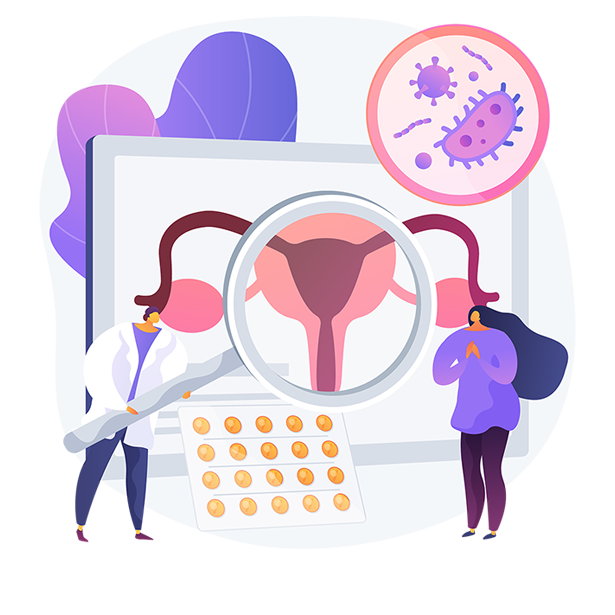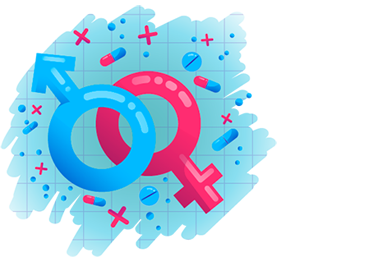Women’s Sexual healthcare
Sexual health is important for a woman's well-being, whether you're trying to prevent pregnancy and sexually transmitted infections or you're worried about low sex drive, painful intercourse or other problems related to women's sexual health. Learn how to achieve a fulfilling sexual relationship, and know how to protect yourself from sexually transmitted infections. As you get older, understand common changes in women's sexual health — and how to maintain a healthy and enjoyable sex life at any age under guidance of experts.
Low Libido
Women's sexual desires naturally fluctuate over the years. Highs and lows commonly coincide with the beginning or end of a relationship or with major life changes, such as pregnancy, menopause or illness. Some medications used for mood disorders also can cause low sex drive in women. If your lack of interest in sex continues or returns and causes personal distress, you may have a condition called sexual interest/arousal disorder.
Symptoms of low sex drive in women include:
-
 Having no interest in any type of sexual activity, including masturbation
Having no interest in any type of sexual activity, including masturbation -
 Never or only seldom having sexual fantasies or thoughts
Never or only seldom having sexual fantasies or thoughts -
 Being concerned by your lack of sexual activity or fantasies
Being concerned by your lack of sexual activity or fantasies
If you're concerned by your low desire for sex, talk to your doctor. The solution could be as simple as changing a medication you are taking, and improving any chronic medical conditions such as high blood pressure or diabetes.


Dyspareunia
Dyspareunia is the term for recurring pain in the genital area or within the pelvis during sexual intercourse. The pain can be sharp or intense. It can occur before, during, or after sexual intercourse. Dyspareunia is more common in women than men. It has many possible causes, but it can be treated.
The most common symptom of dyspareunia is pain which can vary in location:
Hormonal Imbalance
Hormones are your body’s chemical messengers Produced in the endocrine glands that help control many of your body’s major processes, including metabolism and reproduction. Your normal hormonal cycle also changes naturally during Puberty, pregnancy, breastfeeding, menopause.
Symptoms of a hormonal imbalance specific to females include:
-
 heavy or irregular periods, including missed periods, a stopped period, or a frequent period
heavy or irregular periods, including missed periods, a stopped period, or a frequent period -
 hirsutism, or excessive hair on the face, chin, or other parts of the body
hirsutism, or excessive hair on the face, chin, or other parts of the body -
 acne on the face, chest, or upper back
acne on the face, chest, or upper back -
 hair loss
hair loss -
 darkening of the skin, especially along neck creases, in the groin, and underneath the
breasts
darkening of the skin, especially along neck creases, in the groin, and underneath the
breasts -
 skin tags
skin tags -
 vaginal dryness
vaginal dryness
-
 vaginal atrophy
vaginal atrophy
Vaginismus
Vaginismus is the involuntary tensing or contracting of muscles around the
vagina.
These unintentional muscle spasms occur when something — a penis, finger, tampon
or medical instrument — attempts to penetrate the vagina. The spasms may be mildly
uncomfortable or very painful. Many people may be too embarrassed to talk about
the problem with their healthcare providers Vaginismus symptoms may appear during
the late teen years or early adulthood when a person has sex for the first time. Some
women develop vaginismus later in life. It can happen after years without any
problems. Spasms or discomfort may occur anytime there’s vaginal penetration. Or
you may have them only at certain times, such as during sex or pelvic exams.
Many people with vaginismus no longer experience the problem after treatment. But
successful treatment takes time, so you’ll need to be patient and continuous in
treatment with the Doctor.
Women's Healthcare
Sexual arousal disorder is characterized by a lack or absence of sexual fantasies and desire for sexual activity. Women do not feel aroused by any type of sexual genital or non-genital stimulation (eg, kissing, dancing, watching an erotic video, physical stimulation), despite the occurrence of physical genital response. Diagnosis of this problem in any women can be actually done after a proper interview by a medical professional.
Anorgasmia is the medical term for regular difficulty reaching orgasm after ample sexual stimulation. The lack of orgasms distresses you or disturbs your relationship with your partner. Orgasms vary in intensity, and women vary in the frequency of their orgasms and the amount of stimulation needed to trigger an orgasm. Most women require some degree of direct or indirect clitoral stimulation. Plus, orgasms often change with age, medical issues or medications you're taking. If you're happy with the climax of your sexual activities, there's no need for concern. However, if you're bothered by the lack of orgasm or the intensity of your orgasms, talk to your Doctor.
Sexual function is the most important component of quality of life. Sexual dysfunctions are more common in women than men, yet it is less frequently diagnosed. A gynaecological condition disturbs a women’s physical and mental wellbeing and resulting in low self-esteem. Left untreated can lead to sexual problems which can be associated with decreased quality of life, depression and inter personal conflicts. A doctor’s appointment can clarify your doubts and can add more value to your life.

Sexually Transmitted Diseases (STD's)
STDs may cause serious, life-threatening complications including cancers, infertility, ectopic pregnancy, spontaneous abortions, stillbirth, low birth weight, neurologic damage, and death. So an early identification of symptoms and early diagnosis and early appointment with a doctor can avoid serious complications in relationship and life also. Common STDs in women include Chlamydia, genital herpes, human papillomavirus (HPV) infection, syphilis, gonorrhea, pubic lice, chancroid, and HIV/AIDS

Are you ready to start online visit?
If you have any concerns, we would like to help. To get started, go online.
Start online consultation







